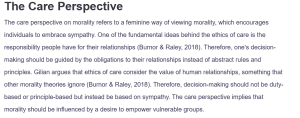The Care Perspective
The care perspective on morality refers to a feminine way of viewing morality, which encourages individuals to embrace sympathy. One of the fundamental ideas behind the ethics of care is the responsibility people have for their relationships (Burnor & Raley, 2018). Therefore, one’s decision-making should be guided by the obligations to their relationships instead of abstract rules and principles. Gilian argues that ethics of care consider the value of human relationships, something that other morality theories ignore (Burnor & Raley, 2018). Therefore, decision-making should not be duty-based or principle-based but instead be based on sympathy. The care perspective implies that morality should be influenced by a desire to empower vulnerable groups.
If the care perspective were to be embraced in the legal system, legal decisions would differ significantly from the justice perspective. Adopting the care perspective would influence judges to consider the context in which an offender offends or the pathways to offending before rendering a judgment. For instance, an offender accused of distributing illegal drugs may be referred to community service instead of being jailed. Alternatively, one may be referred to a shelter program and potentially connected to job opportunities. Such a decision is influenced by understanding the circumstances that lead to offending (Held, 2006). Sympathy will be given if the individual is unemployed, homeless, or belongs to a minority race that has faced structured historical injustices.
Moreover, the desire to preserve relationships will influence decisions if the care perspective is embraced. From a justice perspective, an individual accused of assaulting their spousal partner is likely to face assault charges and potentially go to jail. However, the care perspective takes a different direction, as the individual may be excused from punishment. Instead, the legal system will encourage reconciliation to resolve the conflict. From the care perspective, the moral responsibilities of a relationship override the ideal of impartiality demanded by universalism.
Ethics of care emphasizes the need to embrace equity and empower the vulnerable. Most of the problems in society today are caused by unequal wealth distribution and inaccessible opportunities. Based on care ethics, people are encouraged to embrace interconnectedness and shun the individualism characterized by capitalism.
References
Burnor, R., & Raley, Y. (2018). Ethical choices: An introduction to moral philosophy with cases. Oxford University Press.
Held, V. (2006). The ethics of care: Personal, political, and global. Oxford University Press. https://voidnetwork.gr/wp-content/uploads/2016/10/The-Ethics-of-Care-Personal-Political-and-Global-by-Virginia-Held.pdf
ORDER A PLAGIARISM-FREE PAPER HERE
We’ll write everything from scratch
Question 
Discussion Post 7
Do not use AI to generate or edit your post. Do not use AI to generate or edit your responses to your peers.
In this module, we considered the differences between a “justice” and a “care” perspective in morality. Most of the theories we’ve discussed together in this class have been on the “justice” side (Kant, Utilitarianism, etc.), and there is good reason to think that the moral elements of our legal system are, too. What would our everyday morality look like if it were based on the “care” perspective (for example, in our legal system)? What does the “care” perspective teach us about the different ways we could organize our societies?

The Care Perspective